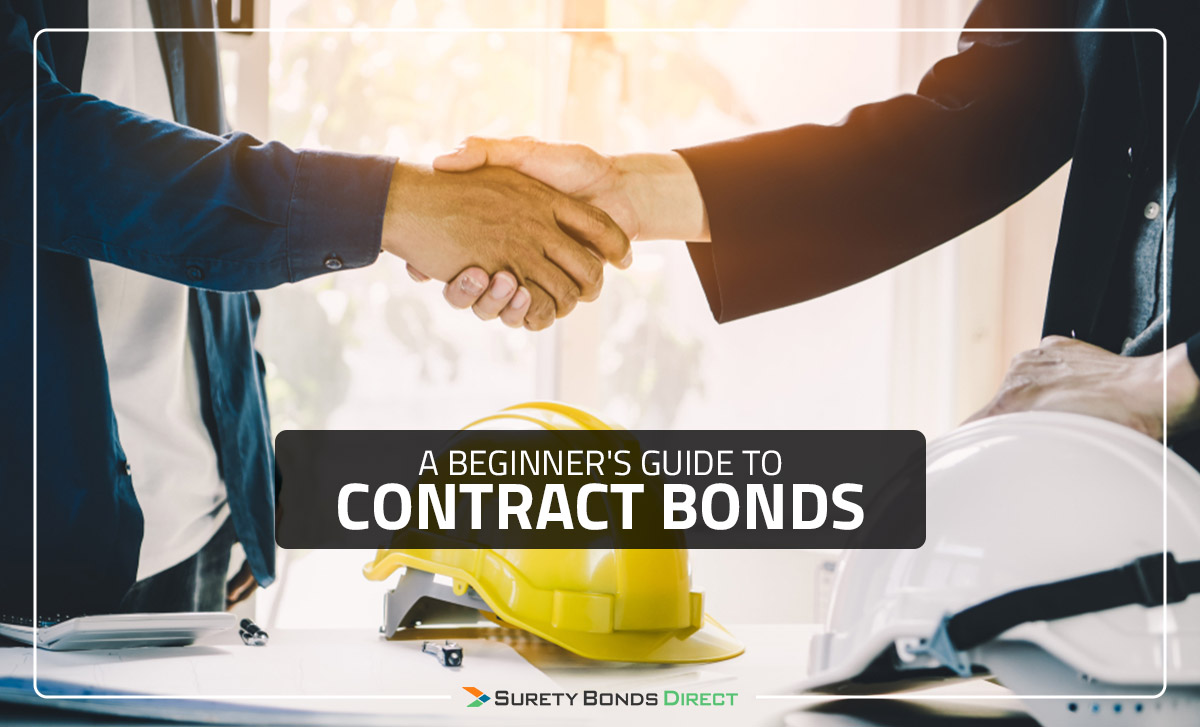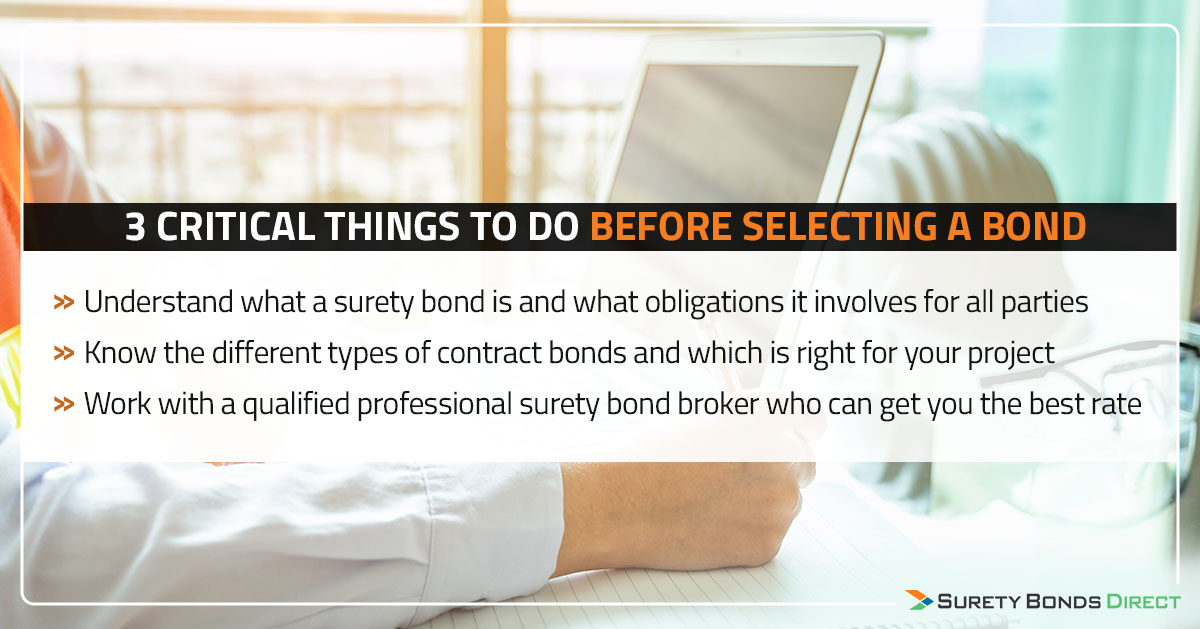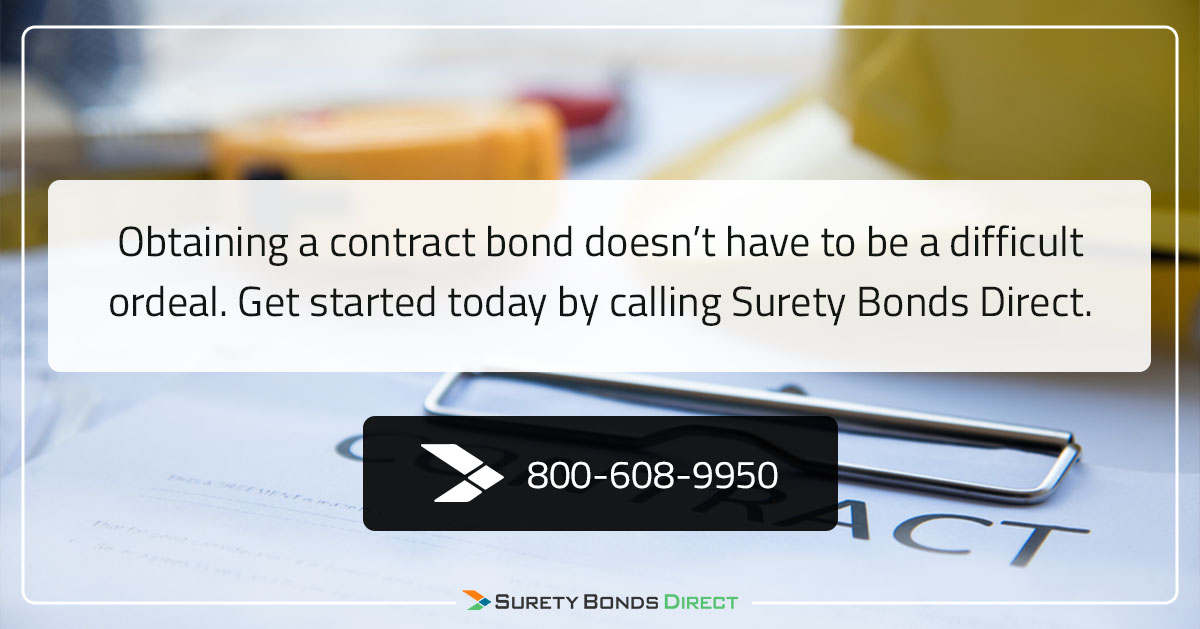A Beginner's Guide to Contract Bonds
Various types of contract bonds are required for construction and maintenance contracts, especially for government work.

Business owners and customers alike often wonder what the best way is to secure a contract and ensure that another party fulfills their obligations. Over time, the business world has come up with all kinds of solutions, but one method that's among the most common is to require a surety bond. This is most prevalent in the construction industry as we'll examine, but surety bonds backing performance are increasingly common in other industries.
Those new to the world of surety bonds (some types of which are also known as contract bonds) should know that it's critical to do three things when selecting a bond:
- To understand what a surety bond is and what obligations it involves for all parties.
- To get familiar with the different types of contract bonds and determine which one is right for your business.
- To work with a qualified professional bond broker who can get you the best rate on a surety bond.

Surety bonds can be a somewhat technical topic and even many experienced contractors have never heard of surety bonds before being told they need one. The specialized world of performance bonds, maintenance bonds, bid bonds, and other contract bonds can be intricate, so as part of our total commitment to customer service, we like to give our customers key relevant information, whether you've bought a surety bond before or not.
Let's get some answers about what surety bonds are, why and when you might need them, and how the various types of contract bonds work.
What Does a Contract Bond Do?
Surety bonds are three-party agreements that provide a financial guarantee that one party will fulfill their legal, contractual, or ethical obligations to another. You can read about the basics of how a surety bond works in our article What Is a Surety Bond?
The term "contract bond" refers to several surety bond types that are typically used in construction contracts to ensure that a project is completed to satisfaction, all wages are paid out, and that the deliverables are per the requirements and standards of the contract . For the vast majority of contract bond obligees, contracts are completed with everyone's approval and the surety doesn't have to get involved. If a disagreement does occur, and no compromise can be agreed upon between the principal and the client (who is generally the obligee for a contract bond), a customer or supplier can file a claim with the surety for financial compensation. The surety will investigate the claim, and if found to be valid, the surety will pay the claim in an amount up to the bond penalty.

It's critical to remember that a surety bond is more like a line of credit than it is like insurance. Thus, if the surety pays out a claim, the principal is still ultimately liable for all money paid, because part of the process of obtaining a surety bond is signing an indemnity agreement that obligates the principal to compensate the surety for claims paid.
What Kinds of Contract Bonds Are Available?
Contract bonds are most common in the construction industry performing "sticks and bricks" projects, but surety bonds are also required for other types of projects in and out of the construction industry. Some surety bonds (in construction and otherwise) relate to the bidding process or maintenance after-the-fact. Here are several of the most common types of contract bonds:
- Bid Bond
- The bidding process for a project has several components, one of which is demonstrating that a contractor will be able to obtain the necessary performance, payment, maintenance, or other bonds that are required. The bid bond is a bond that is generally submitted during the bidding process as a pre-qualification for the contractor to demonstrate to the obligee that the contractor is "bondable." Most bid bonds are set to 5-10% of the actual project bond amount and the bond is included with other materials such as proof of insurance, a works-in-progress report, a formal proposal, and other documentation required for the specific project. Most surety underwriters will underwrite the bid bond as if it were the full amount of the performance bonds required to complete the project, but will not verify all bank and financial statements unless the bid is won and there is an application for the actual performance bond. An honest representation of financials while procuring the bid bond will most often lead to a seamless transition to obtaining a performance bond.
- Performance Bond
- A major type of bond used in construction projects, a performance bond guarantees satisfactory completion of a project. The Miller Act requires that contractors on most construction projects that use federal funds obtain performance bonds to protect the government's investment. For bond amounts over $1,000,000 contractors should plan to provide audited financial statements as well as personal financial statements.
- Supply Bond
- Many construction projects require intensive and costly supply operations. A supply bond guarantees that a supplier will deliver the requested materials and equipment on time and in good condition.
- Payment Bond
- Subcontractors and suppliers often need the protection of a surety bond as well, and that's where payment bonds come in. A payment bond guarantees that a contractor will pay their suppliers and subcontractors according to the terms agreed upon in the contract. In some states, similar bonds are required for licensure as the financially responsible officer of an organization.
- Maintenance Bond
- A maintenance bond ensures that the work a contractor does is completed to hold up over time–you can think of the maintenance bond as being similar to a warranty for the contractor's work. The bond protects against materials or workmanship defects and covers necessary replacements and repairs for a specified period after a project's completion. The maintenance period will be clearly defined in the contract and certain "regular maintenance" should be contractually excluded from the definition of material defects.
- Subdivision Bond
- When landowners / developers subdivide property (usually to develop a new neighborhood) local municipalities will often require a subdivision surety bond to ensure that all public property such as roads, sidewalks, and drainage systems are not damaged and any new extensions of such are built to code.
How Do I Know Whether I Need a Contract Bond?
Most businesses and nearly all government organizations will require various types of contract bonds before they'll finalize your bid on a construction project. Thus, the process of submitting a bid for a construction project should always involve researching the bonds you'll need to obtain. The government agency or project authority responsible for evaluating bids will be able to provide information on what kind of bonds they require contractors to purchase when submitting or accepting a bid, including a bond for the bid itself.

Unfortunately, some requests for proposal (RFP) contain vague language regarding the bond specifics, or embed the bond form deep within the formal RFP. You should always expressly ask for the bonds requirements to submit a bid and to formally win the contract. You should keep a copy of the formal RFP and provide it to a bond specialist to review when you request quotes.
Remember that the surety underwriters consider not only your eligibility for the bond, but the specific language of the bond form itself which may be risky or loosely defined. You should always ask for the bond form if it isn't included with the RFP and provide the form to a surety specialist. Unlike license bonds where a surety will have the bond form "on file," most contract bonds are 1-off forms or are written at a local municipal level. Even if the surety has written such bonds before, there isn't a good way to know that the surety has the latest version unless you provide the form expressly.
How Is My Rate for a Contract Bond Determined?
The rates you'll pay for a contract bond can vary widely, but in most cases, they'll be around 2-3 percent of the bond amount. Many bid bonds are available for a low flat-fee. Depending on the amount of the bond(s) required, you should expect the surety to run a credit check on all of the owners at minimum. As the bond amount rises, the surety underwriters will need increasingly more information including a formal copy of the proposal, a complete works-in-progress report (WIP), current bank statements, and business financials (usually a balance sheet and a profit & loss for YTD and the 2 years prior).
Remember that a surety bond has a lot in common with getting a line of credit. Thus, the process to get a surety bond is similar in many ways to getting a loan or credit card. On most bonds, for example, you'll receive a rate that's based on the level of risk that a surety's underwriters assign to your business. That can mean that, for some individuals and businesses with imperfect credit or poor financials, premiums can be substantially higher. A history of similar-sized projects completed and having multiple years in business will help with approval and bond costs.
What Options Are Available if I Don't Have Great Credit?
We all know that stuff happens. Bad credit is incredibly common, and it can come from all kinds of places–bankruptcies, medical debt, and more. Unfortunately, it can often raise the rates sureties will quote you for a bond. If you or your business partners have credit problems and are trying to get bonded, it can increase costs considerably.
Fortunately, your credit doesn't have to define the future of your business. At Surety Bonds Direct, our bond specialists have options available for individuals and businesses who've had credit problems in the past. We have sureties in our networks who specialize in working with customers with bad credit and can help you get approved at an affordable rate even without a strong credit score.

Obtaining a contract bond doesn't have to be a difficult ordeal. Surety Bonds Direct offers every type of bond we've discussed in this article, and we want to show you just how easy it can be to get an affordable premium on the contract bonds you need. Get started today by calling Surety Bonds Direct at 1-800-608-9950 or contact us online for a free, no-obligation quote on your surety bond.
 Jason O'Leary
Jason O'Leary
updated: